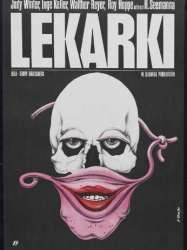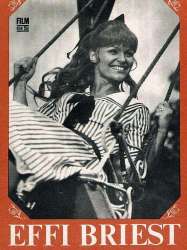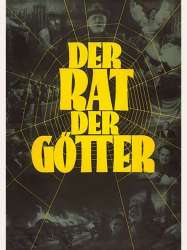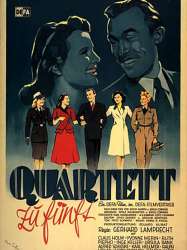Inge Keller is a Actor Allemande born on 15 december 1923 at Berlin (German)

Inge Keller (born 15 December 1923) is a German actress whose career on stage and screen has spanned seven decades. She was one of the most prominent performers in the former German Democratic Republic and is still widely acclaimed.
Keller was born to an affluent family. Her father owned a quarry, and her mother was an industrialist's daughter. She had an older sister and a younger brother. Keller begun studying acting out of a whim, after a friend recommended it, and her family did not object.
She made her debut on stage at the Kurfürstendamm Theater on 18 November 1942. In 1943, she became a member of the cast in the Freiberg State Theater, and then moved to the Chemnitz Theater in 1944. Alongside all other theaters in Nazi Germany, the latter was closed down on 1 September 1944, when Joseph Goebbels decided to "extend the Total War into the cultural sphere." Keller lost her exempt status as an actress (as did all artists who were not in the God's Gifted List) and was called up for the Reich Labour Service. She entered a sham marriage to avoid conscription, and divorced soon afterwards. Keller told interviewer Günter Gaus that she was "simply too lazy" to join.
Breakthrough
After the war, Keller returned to act in Freiberg, then at the Soviet Occupation Zone, where she remained until 1947. In 1948, she moved to the Hebbel Theater in Kreuzberg, West Berlin. Soon after, director Boleslaw Barlog was impressed by her and accepted her into the Schlosspark Theater in Steglitz, where she received her first major role, that of Waltraut 'Pützchen' von Mohrungen, in The Devil's General. She depicted the character in 250 performances of the play. In all these institutions she also frequently portrayed the character of Inge Ruoff in Friedrich Wolf's Professor Mamlock. At that time, she met and became romantically involved with Karl-Eduard von Schnitzler, whom she followed to East Berlin in 1950. There, she joined the Deutsches Theater, on the stage of which she made her first appearance on 23 December 1950. She remained a member of the ensemble for fifty years.
Height of career
She and von Schnitzler married in 1952, but divorced in 1956; they had one daughter, Barbara, who also became an actress. In the same year, Keller also became a member of the National Front's National Council.
During her long career in the Deutsches Theater, she depicted a large variety of roles. In 1952, she first portrayed Eliza Doolittle in George Bernard Shaw's Pygmalion, directed by Rudolf Noelte. Keller appeared as Doolittle in 472 performances through the years. In 1953, she depicted Emilia in Wolfgang Heinz's production of Othello, with Ernst Busch as Iago. Some other important roles she had in the 1950s included Goneril in Wolfgang Langhoff's 1957 staging of King Lear and Masha in his 1958 production of Three Sisters. In addition to theater, she also appeared in cinema and television, with a first notable role in Kurt Maetzig's 1950 film The Council of the Gods.
On 30 March 1960, Keller received the Art Prize of the German Democratic Republic. On 6 October 1961, she received the National Prize of East Germany, 1st class, for her participation in the television miniseries Conscience in Turmoil: she played the wife of an army officer (Erwin Geschonneck) who chose to surrender Greifswald to the Red Army without a shot, saving the city from ruin. The series was based on the life of Colonel Rudolf Petershagen.
On 4 October 1963, she first performed what was described as "the role of her life", that of the title character in Iphigenia in Tauris, Langhoff's last production before his death. Langhoff's son and theater director in his own right Thomas described her depiction of the Greek princess as "incomparable to anything". Der Tagesspiegel columnist Christoph Funke commented: "Keller turned that role into an unprecedented epitome in the portrayal of strong, self-aware women."
In 1977, she received the National Prize once again. On 24 April 1981, she first appeared in one of her most remembered roles from the 1980s, as Julie in Danton's Death. On 18 November 1983 she performed Mrs. Alving in the East Berlin premiere of Ghosts, another of her stock characters from that decade, with Ulrich Mühe as Oswald.
After reunification
In 1999, Keller portrayed the older Lilly Wust in the Golden Globe nominated Aimée & Jaguar. She won the Award for the Best Supporting Actress in the 36th International Antalya Golden Orange Film Festival for her participation in the film Lola and Billy the Kid. In 2000, she received the Caroline Neuber Prize of the City of Leipzig for her "outstanding performance in theater, cinema and television". On 23 July 2000, she performed on the stage of the Deutsches Theater for the last time, delivering the monologue of Elisabeth Matrei in Ingeborg Bachmann's Three Ways to the Lake. She then became an honorary member of the theater, though she continued to act as a guest. On 1 October 2006, Keller received the Order of Merit of Berlin from Mayor Klaus Wowereit. In late 2012, she depicted Tilla Durieux in the play Tilla, by Christoph Hein which ran at the Deutsches Theater, directed by Gabrielle Heinz, daughter of Wolfgang Heinz.
Thomas Langhoff described her as "perhaps the most famous actress of the German Democratic Republic - a star." Deutschlandradio Kultur reporter Dieter Kranz called her "a theater legend".
Source : Wikidata
Inge Keller

Birth name Inge Keller
Nationality German
Birth 15 december 1923 at Berlin (German)
Death 6 february 2017 (at 93 years)
Awards National Prize of East Germany, Order of Merit of Berlin
Nationality German
Birth 15 december 1923 at Berlin (German)
Death 6 february 2017 (at 93 years)
Awards National Prize of East Germany, Order of Merit of Berlin
Biography
Early lifeKeller was born to an affluent family. Her father owned a quarry, and her mother was an industrialist's daughter. She had an older sister and a younger brother. Keller begun studying acting out of a whim, after a friend recommended it, and her family did not object.
She made her debut on stage at the Kurfürstendamm Theater on 18 November 1942. In 1943, she became a member of the cast in the Freiberg State Theater, and then moved to the Chemnitz Theater in 1944. Alongside all other theaters in Nazi Germany, the latter was closed down on 1 September 1944, when Joseph Goebbels decided to "extend the Total War into the cultural sphere." Keller lost her exempt status as an actress (as did all artists who were not in the God's Gifted List) and was called up for the Reich Labour Service. She entered a sham marriage to avoid conscription, and divorced soon afterwards. Keller told interviewer Günter Gaus that she was "simply too lazy" to join.
Breakthrough
After the war, Keller returned to act in Freiberg, then at the Soviet Occupation Zone, where she remained until 1947. In 1948, she moved to the Hebbel Theater in Kreuzberg, West Berlin. Soon after, director Boleslaw Barlog was impressed by her and accepted her into the Schlosspark Theater in Steglitz, where she received her first major role, that of Waltraut 'Pützchen' von Mohrungen, in The Devil's General. She depicted the character in 250 performances of the play. In all these institutions she also frequently portrayed the character of Inge Ruoff in Friedrich Wolf's Professor Mamlock. At that time, she met and became romantically involved with Karl-Eduard von Schnitzler, whom she followed to East Berlin in 1950. There, she joined the Deutsches Theater, on the stage of which she made her first appearance on 23 December 1950. She remained a member of the ensemble for fifty years.
Height of career
She and von Schnitzler married in 1952, but divorced in 1956; they had one daughter, Barbara, who also became an actress. In the same year, Keller also became a member of the National Front's National Council.
During her long career in the Deutsches Theater, she depicted a large variety of roles. In 1952, she first portrayed Eliza Doolittle in George Bernard Shaw's Pygmalion, directed by Rudolf Noelte. Keller appeared as Doolittle in 472 performances through the years. In 1953, she depicted Emilia in Wolfgang Heinz's production of Othello, with Ernst Busch as Iago. Some other important roles she had in the 1950s included Goneril in Wolfgang Langhoff's 1957 staging of King Lear and Masha in his 1958 production of Three Sisters. In addition to theater, she also appeared in cinema and television, with a first notable role in Kurt Maetzig's 1950 film The Council of the Gods.
On 30 March 1960, Keller received the Art Prize of the German Democratic Republic. On 6 October 1961, she received the National Prize of East Germany, 1st class, for her participation in the television miniseries Conscience in Turmoil: she played the wife of an army officer (Erwin Geschonneck) who chose to surrender Greifswald to the Red Army without a shot, saving the city from ruin. The series was based on the life of Colonel Rudolf Petershagen.
On 4 October 1963, she first performed what was described as "the role of her life", that of the title character in Iphigenia in Tauris, Langhoff's last production before his death. Langhoff's son and theater director in his own right Thomas described her depiction of the Greek princess as "incomparable to anything". Der Tagesspiegel columnist Christoph Funke commented: "Keller turned that role into an unprecedented epitome in the portrayal of strong, self-aware women."
In 1977, she received the National Prize once again. On 24 April 1981, she first appeared in one of her most remembered roles from the 1980s, as Julie in Danton's Death. On 18 November 1983 she performed Mrs. Alving in the East Berlin premiere of Ghosts, another of her stock characters from that decade, with Ulrich Mühe as Oswald.
After reunification
In 1999, Keller portrayed the older Lilly Wust in the Golden Globe nominated Aimée & Jaguar. She won the Award for the Best Supporting Actress in the 36th International Antalya Golden Orange Film Festival for her participation in the film Lola and Billy the Kid. In 2000, she received the Caroline Neuber Prize of the City of Leipzig for her "outstanding performance in theater, cinema and television". On 23 July 2000, she performed on the stage of the Deutsches Theater for the last time, delivering the monologue of Elisabeth Matrei in Ingeborg Bachmann's Three Ways to the Lake. She then became an honorary member of the theater, though she continued to act as a guest. On 1 October 2006, Keller received the Order of Merit of Berlin from Mayor Klaus Wowereit. In late 2012, she depicted Tilla Durieux in the play Tilla, by Christoph Hein which ran at the Deutsches Theater, directed by Gabrielle Heinz, daughter of Wolfgang Heinz.
Thomas Langhoff described her as "perhaps the most famous actress of the German Democratic Republic - a star." Deutschlandradio Kultur reporter Dieter Kranz called her "a theater legend".
Usually with
Filmography of Inge Keller (11 films)
Actress

Three (2010)
, 2hDirected by Tom Tykwer
Origin German
Genres Drama, Comedy, Romance
Themes Films about sexuality, Bisexuality-related films, LGBT-related films, LGBT-related films, LGBT-related film
Actors Sebastian Schipper, Sophie Rois, Angela Winkler, Carina Wiese, Christina Große, Christian Steyer
Rating66%





Hanna and Simon are in a long-term relationship which, though loving, has grown sexually unexciting. Soon after Simon's mother dies from advanced pancreatic cancer, he discovers that he has testicular cancer and must undergo surgery and chemotherapy. The night of his surgery, Hanna has a sexual encounter with a man called Adam, and Simon learns that he had fathered a child seventeen years earlier, although the woman opted for an abortion. Simon, who had assumed that either he or Hanna was infertile, is assured that he should still be able to have children after his surgery. During his recovery, Simon and Hanna decide to finally wed. Shortly beforehand, Simon encounters Adam at the pool and begins an affair with him as well.

Aimée & Jaguar (1999)
, 2h5Directed by Max Färberböck
Origin German
Genres Drama, Biography, Historical, Romance
Themes Films about religion, Films about sexuality, Bisexuality-related films, LGBT-related films, Political films, Films about Jews and Judaism, LGBT-related films, LGBT-related film, Lesbian-related films
Actors Maria Schrader, Juliane Köhler, Johanna Wokalek, Dani Levy, Heike Makatsch, Detlev Buck
Roles Lilly Wust (1997)
Rating71%





The film explores the lives of the characters Felice Schragenheim (Maria Schrader), a Jewish woman who assumed a false name and who belongs to an underground organization, and Lilly Wust (Juliane Köhler), a married mother of four children, unsatisfied with her philandering Nazi officer husband.

Lola and Billy the Kid (1999)
, 1h30Genres Drama, Romance
Themes L'adolescence, Films about children, Films about sexuality, LGBT-related films, Teen LGBT-related films, LGBT-related films, LGBT-related film
Actors Baki Davrak, Inge Keller, Axel Pape, Aykut Kayacık, Erden Alkan
Roles Ute
Rating68%





Seventeen-year-old Murat, from Turkey but living in Berlin, Germany with his mother and older brother Osman, seems to be struggling with his sexuality while Osman, head of the household since the father’s death and a taxi driver, strongly urges Murat to lose his virginity to a woman. However, suspecting that Murat is gay and believing that his Turkish background makes him lesser of a person, some boys from Murat’s school harass and beat him.

Woman Doctors (1984)
, 1h47Directed by Horst Seemann
Genres Drama
Actors Judy Winter, Inge Keller, Walther Reyer, Michael Gwisdek, Barbara Dittus, Leon Niemczyk
Roles Dr. Lydia Kowalenko
Rating60%






The Fiancee (1980)
, 1h23Directed by Günter Reisch
Genres Drama
Themes Political films
Actors Jutta Wachowiak, Inge Keller, Regimantas Adomaitis, Slávka Budínová, Katrin Sass, Ewa Ziętek
Roles Irene
Rating69%






Effi Briest (1970)
, 2h5Genres Drama
Themes Films about sexuality
Actors Angelica Domröse, Gerhard Bienert, Inge Keller, Günther Ballier, Blanche Kommerell
Roles Frau von Briest
Rating54%





Differences from novel

Frau Venus und ihr Teufel (1967)
Directed by Ralf Kirsten
Genres Comedy, Musical theatre, Musical
Themes Time travel films
Actors Manfred Krug, Ursula Werner, Inge Keller, Carola Braunbock
Roles Venus
Rating66%






Die letzte Heuer (1951)
Genres Drama
Actors Inge Keller, Gustav Püttjer, Gerhard Frickhöffer, Reinhard Kolldehoff, Werner Pledath, Wolf Kaiser
Roles Charly

Zugverkehr unregelmäßig (1951)
Genres Drama, Crime
Actors Claus Holm, Inge Keller, Brigitte Krause, Margarete Kupfer, Werner Pledath, Theo Shall
Roles Ellen Zander
Rating60%






Council of the Gods (1950)
, 1h50Directed by Kurt Maetzig
Origin German
Genres Drama
Actors Paul Bildt, Fritz Tillmann, Inge Keller, Agnes Windeck, Brigitte Krause, Arthur Wiesner
Roles Edith Scholz
Rating65%





In the early 1930s, Dr. Scholz is a chemist working for IG Farben. While he develops new types of rocket fuel and a gas which he believes to be a pesticide, his corporate superiors support Adolf Hitler in his quest to dominate Germany, and subsequently, the whole of Europe. Director General Mauch and his fellow managers, who jokingly call themselves 'the council of the gods', are cleverly using the Second World War to earn a fortune, by supplying the Third Reich and - through their cartel with Standard Oil - the Western Allies. Scholz, fearing to lose his position, turns a blind eye even as he realizes what the gas he developed is used for. Throughout the war, American bombers do not destroy IG Farben plants, as they are pressured by the company's associates in the United States to leave its infrastructure intact. After the war ends, the Americans acquit most of the directors from charges of crimes against humanity and secretly use their experience to produce chemical weapons, that would be deployed against the Soviet Union. After an explosion in a chemical factory kills hundreds, Scholz - who is now a communist - cannot remain silent. He publicizes the truth about IG Farben's wartime activity, warning that they plan yet another to make more money. An immense demonstration takes place outside the firm's headquarters. The American general supervising the managers proposes to disperse them with tanks, but Mauch refuses, fearing the crowd's reaction. The demonstration turns into a May Day rally.

Quartett zu fünft (1949)
Directed by Gerhard Lamprecht
Genres Comedy, Romance
Actors Claus Holm, Inge Keller, Karl Hellmer, Margarete Schön, Clemens Hasse, Gustav Püttjer
Roles Irene Gabriel
 Connection
Connection



